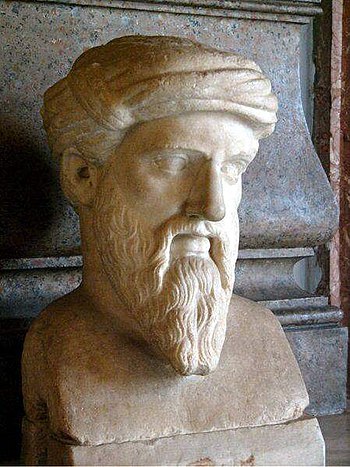
We’ve probably all heard of Pythagoras. In junior high the Pythagorean theorem is a mainstay of math class.
For a right-angled triangle, the square of the length of the hypotenuse is equal to the sum of the squares of the remaining two sides.
Some might not know, however, that Pythagoras is one of those characters where it really is difficult to separate the myth from the man.
He existed, no doubt. That’s not the issue. But it is uncertain just how much he really knew; what the man actually said and did.
Part of the difficulty in sorting through all the legends is that his followers did, in fact, create a story – actually stories – about him. And those stories, replete with potential errors, fibs and embellishments, were passed on through the centuries, mistakes probably magnified at every turn.

One could say the same about Jesus Christ or Buddha.¹ Or any aspect of the Bible and most religious scripture. That doesn’t necessary detract from the overall message but it does make us think.
Hopefully…
Having said this, most see Pythagoras as a Greek philosopher and scientist born on the island of Samos around 570–495 BCE.
He is credited with discovering how musical intervals relate to mathematical proportions, the Pythagorean theorem and a complex system of portraying the universe through numbers.
Pythagoras’ moral teachings include asceticism and a belief in the transmigration of souls–that is, reincarnation. He founded a religious school in Crotona but was forced to move to Metapontum due to prolonged persecution.
S. G. F. Brandon says this persecution probably arose because of Pythagoreanism’s similarity to Orphism.²

On this point social psychologists and sociologists propose an “in-group/out-group” theory of conflict. According to this view, persecution arises when a minority group shares too many qualities with the powerful, orthodox group it threatens or challenges.
Nobody cares if the two groups are entirely different. But when they share some key concepts and practices, that’s when the dust flies.
And as history reveals, the two groups’ respective clout need not be dramatically skewed for this dynamic to take place: Jews and Muslims; Christians and Jews; Christians and Muslims; Liberals and Conservatives; Democrats and Rebublicans; Communists and Capitalists.
The list goes on.
Not just a dry philosophy, Pythagoreanism was a practical guide to living a valuable life. Pythagoras is also credited with providing a threefold theory of the soul. One that combines mysticism and practicality.³
Pythagoras maintained that the soul has three vehicles: (1) the ethereal, which is luminous and celestial, in which the soul resides in a state of bliss in the stars; (2) the luminous, which suffers the punishment of sin after death; and (3) the terrestrial, which is the vehicle it occupies on this earth.4
Muslims believed that Pythagoras was initiated into the sacred mysteries by Hermes (Egyptian Thoth). His thinking, and that of his followers, also had a profound influence on the work of the mystically inclined Plato.
Some maintain that Plato’s Republic, which outlines the ideal community, is based on a Pythagorean community established in Croton.
Pythagorean ideas resurfaced in Rome and Alexandria from the 1st century BCE onward. Many have written about Pythagoras.5 But again, this only confuses the story. Are we hearing about the man or the myth?
—
¹ Christians are often criticized for this; Buddhists, rarely. Christianity, after all, is the most persecuted religion in the world today.
² S. G. F. Brandon (ed.) Dictionary of Comparative Religion, New York: Scribner’s, 1970, p. 520.
³ Most mystics would dispute this distinction, arguing that mysticism is supremely practical, given the eternal or everlasting nature of existence and the prospect of a favorable or unfavorable afterlife.
4 https://en.wikipedia.org/wiki/Pythagoras
5 https://en.wikipedia.org/wiki/Pythagoras#Timeline_of_sources
Related » David Bowie, Music of The Spheres, Numerology
For more see my highlights at LINER
